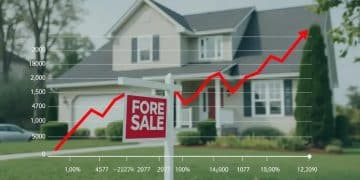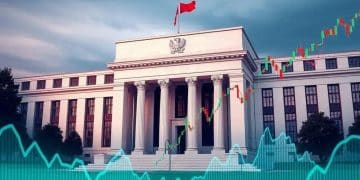Federal interest rate hike impact on housing markets

Anúncios
The federal interest rate hike impacts housing by increasing mortgage costs, influencing buyer affordability, and potentially stabilizing or lowering home prices due to reduced demand.
The federal interest rate hike impact on housing is a crucial topic for anyone following real estate trends. Have you noticed how interest rates shape buying decisions and overall market dynamics? Let’s delve into this important issue.
Anúncios
Understanding the federal interest rate and its significance
Understanding the federal interest rate is essential for anyone looking to navigate today’s housing market. This rate is set by the Federal Reserve and impacts how much banks can charge for loans. A rise in the rate can lead to higher mortgage rates, affecting home buyers nationwide.
When the Federal Reserve raises the interest rate, it influences the entire economy. Higher rates mean borrowing costs increase, which can slow down spending. For potential homebuyers, this translates to higher monthly payments. Understanding these dynamics can help buyers make informed decisions.
Anúncios
How the Federal Interest Rate Works
The federal interest rate is the rate at which banks lend money to each other overnight. It sets the tone for all other interest rates, including mortgages. When this rate rises, banks pass along these costs to consumers. This is where real estate comes into play.
Here are key ways this rate affects the housing market:
- Increased mortgage rates can lead to lower home affordability.
- Home prices may stabilize or decrease if buyer demand drops.
- Investors may shift to less volatile assets, impacting the housing market.
As the economy strengthens, the Federal Reserve often raises rates to combat inflation. This means potential buyers should be aware that waiting for the perfect moment can lead to missed opportunities.
The Impact on Home Purchases
With higher mortgage rates, many buyers may reconsider their budgets. They might seek smaller homes or even delay their purchases. Additionally, first-time homebuyers often find it particularly challenging to secure a mortgage.
Consider these factors:
- Affordability becomes a key issue as rates rise.
- Fixed-rate mortgages can save buyers in a fluctuating market.
- The ability to negotiate may change as market conditions shift.
By staying informed about the federal interest rate and its implications, homebuyers can make smarter choices. As the trend evolves, maintaining awareness will help you navigate through the ups and downs of the housing market.
How rising rates influence mortgage costs

Rising rates significantly influence mortgage costs, making it vital for potential homebuyers to understand this connection. As the federal interest rate increases, banks typically hike the interest rates on mortgages, which affects the overall cost of buying a home. This shift can lead to unexpected costs for many buyers.
Understanding how these changes play out can help you prepare for the financial impact. For those with a fixed-rate mortgage, existing payments remain stable, but new buyers may face different challenges due to higher rates.
The Effect on Monthly Payments
When mortgage rates rise, monthly payments can increase significantly for new loans. A smaller increase in interest rates can lead to substantial changes in payment amounts over the life of a loan. It alters the affordability for homebuyers, often pushing them to consider smaller or less desirable homes.
Here are some important effects of rising rates on monthly mortgage payments:
- Higher monthly payments can limit homebuying options.
- Fixed-rate mortgages become more attractive because they lock in lower rates.
- Adjustable-rate mortgages can lead to unpredictability in budgeting.
Many buyers begin to feel the pressure when they realize their dream home is less attainable because of rising costs. This means they might have to make compromises on home features or location.
The Impact on Total Loan Cost
It’s not just about the monthly payment; the overall cost of the loan can also increase dramatically with higher rates. A small percentage increase in interest can result in thousands of dollars more in payments over 30 years. For buyers, this makes it crucial to calculate the total cost of buying a home under varying interest rate scenarios.
The implications are clear:
- A higher interest rate equals a higher overall loan cost.
- Longer loan terms might seem appealing but increase total interest paid.
- Understanding amortization can help buyers see the long-term impact of rising rates.
As market conditions change, being informed allows buyers to adapt and make better financial decisions. They can also choose to act quickly before rates rise further and they are caught off guard.
Impact on home buyers and sellers
The impact on home buyers and sellers due to changes in the federal interest rate cannot be overstated. As mortgage rates increase, potential buyers often find themselves reconsidering their options. It’s a time of adaptation for many people in the real estate market.
When interest rates climb, home buyers face higher monthly payments. This change can make it challenging for first-time buyers to enter the market. Many buyers begin to think strategically about how to afford a home, and some may even postpone their purchases until rates stabilize.
Buying Power and Market Dynamics
For home buyers, the rising rates can effectively reduce their overall buying power. This means that some buyers who previously qualified for certain homes might now be priced out of the market. It’s important for these buyers to adjust their expectations and be flexible with their home search.
These are key factors that buyers should keep in mind:
- Higher mortgage rates lead to increased monthly payments.
- Buyers may need to consider lower-priced homes or different neighborhoods.
- Timing the market can be risky; waiting may lead to further increases.
For sellers, the dynamics of the market also shift with rising interest rates. While some may worry they won’t sell quickly, others may find that their homes retain their value despite these changes.
Sellers’ Strategies in a Changing Market
Sellers should be prepared to adjust their strategies. In a market where buyers are more cautious, the competition might lessen. This scenario can be an advantage for sellers who are willing to negotiate on price and terms.
Here are ways sellers can respond:
- Pricing competitively to attract more buyers.
- Offering incentives such as closing cost assistance.
- Enhancing home appeal through staging and repairs.
Understanding the impact on home buyers and sellers is crucial in today’s changing market. Both parties need to be informed and ready to adapt their strategies to navigate this landscape effectively. Noticing these trends can provide a clearer picture of the current real estate environment.
Long-term effects on housing market trends

The long-term effects on housing market trends can be profound when interest rates rise. Over time, these changes create a ripple effect throughout the real estate landscape. Home prices, buyer behavior, and overall market health are all significantly influenced in this environment.
As mortgage rates climb, the immediate response from many buyers is to pull back. This hesitation doesn’t just affect individual transactions; it can shift overall trends in the housing market. Understanding these long-term impacts is crucial for both buyers and sellers.
Impact on Home Prices
One of the most noticeable effects of rising interest rates is on home prices. Historically, when rates increase, home prices may stabilize or even decrease due to lower demand from buyers. This condition creates a more balanced market, but sellers might find it harder to achieve their desired sale prices.
Key points to consider regarding home prices include:
- Higher interest rates can lead to decreased buying power, lowering demand.
- Sellers may need to be more flexible with pricing to attract buyers.
- Long-term price trends may reflect a downward adjustment in overheated markets.
As the market adjusts, it’s essential to monitor these changes closely to deepen understanding and strategic planning.
Changes in Buyer Behavior
The behavior of buyers can shift dramatically in response to rising rates. Many potential buyers may delay their purchasing decisions, waiting for more favorable conditions. This trend can lead to an overall slowdown in the market.
Consider these shifts in buyer behavior:
- Increased interest in adjustable-rate mortgages for perceived savings.
- Focus on more affordable homes or neighborhoods.
- Willingness to negotiate on closing costs and home prices.
This cautious approach can benefit financially savvy buyers prepared to act when opportunities arise. Recognizing these patterns is essential for agents and sellers alike.
Effects on Investment Strategies
For investors, long-term trends are crucial. Rising interest rates can shift priorities, emphasizing stronger cash flows and investment strategies. Investors may choose to hold onto properties rather than sell in a market with high rates, anticipating better conditions in the future.
It’s essential to consider the following:
- Long-term investments may adjust toward rental properties to avoid market sale losses.
- Cash reserves become vital for managing unexpected expenses and opportunities.
- Strategizing for diversification can lessen overall risks.
Understanding the long-term effects on housing market trends provides valuable insights into navigating a shifting landscape, equipping participants to make informed decisions based on market conditions. Keeping these factors in mind helps buyers, sellers, and investors stay ahead.
FAQ – Frequently Asked Questions about the impact of federal interest rate hikes on housing
How do rising interest rates affect home buying decisions?
Rising interest rates typically lead to higher mortgage costs, making it more expensive for buyers, which can cause them to delay their purchases or adjust their budget.
What should sellers do in a high interest rate environment?
Sellers should consider pricing their homes competitively and be more flexible with negotiations to attract buyers who may be cautious due to rising costs.
What are the long-term effects of rising rates on home prices?
Long-term, rising rates can stabilize or lower home prices, as reduced buyer demand impacts overall market conditions.
How can investors adapt to changing interest rates in real estate?
Investors may focus on rental properties and maintain strong cash flow strategies, as higher rates can affect buying conditions and long-term profits.





